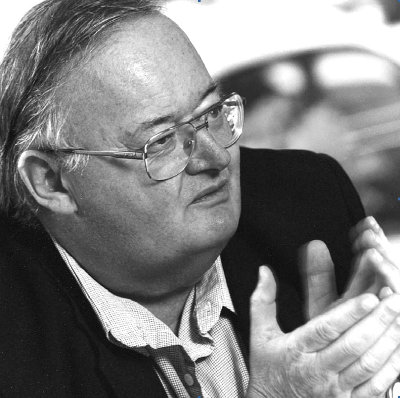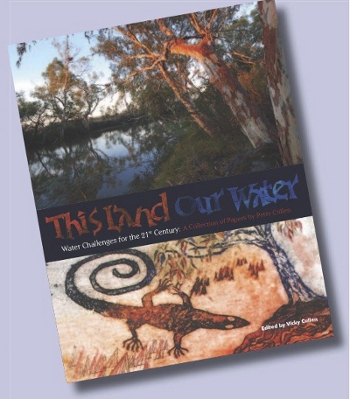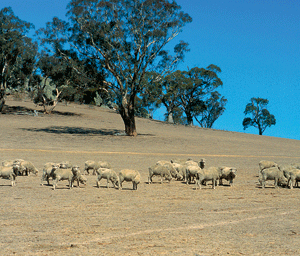
|
Published: 7 November 2011
A water-reform visionary who continues to challenge
Peter Cullen was a leader and a major driving force in water reform across Australia. He effectively combined his extensive ecological understanding with a great awareness of water resource management and policy to address major problems in water management across Australia. In doing so, he proposed solutions and advocated for ecologically sustainable and achievable policies.

|
|
Professor Peter Cullen, 1943–2008, was a leading water scientist and tireless advocate for water in the Australian environment. Credit:
Peter Cullen Water and Environment Trust
|
The major focus of Peter’s concern was the Murray–Darling Basin. Due to over-development of its water resources, the basin harbours a plethora of perplexing problems – most of which became more obvious and pressing in the ‘millennium drought’ that has just finished.
Peter dealt with many different people, ranging from government ministers to irrigators and resource managers to scientists. He got on well with them all.
Peter was an adroit communicator who gave talks on water reform to many different groups in a range of places. He did publish scientific papers, but many of his thoughtful and stirring talks were not published.
Given this, it is wonderful to see that his key presentations have now been published in This Land Our Water. Water Challenges for the 21st Century: A Collection of Papers.
This large folio book, proficiently edited by Peter’s wife, the Reverend Vicky Cullen, presents 23 of his papers, 16 of which were previously unpublished. The text is strongly supported by vivid photographs: some depicting great beauty, some showing management activities, and others displaying lamentable degradation.
The book begins with a foreword by Peter Cosier from the Wentworth Group of Concerned Scientists – a group that Peter was instrumental in founding. This is followed by ‘An appreciation’ of Peter, adapted from his eulogy given by Kate Andrews in March 2008, and an illuminating account of Peter’s life by Vicky (hitherto, I hadn’t known of his great scuba diving prowess).
The book’s 23 papers are divided into seven sections. Interspersed among these are 35 vignettes portraying people’s appreciation of Peter’s efforts, vision, humour and grace. They come from a spectrum of people, from the Hon. John Howard to John Granger, a farmer from Gunning.
While some of the papers date back to 1990, most of them were given during 2006–07 – a remarkable period of outstanding work by Peter, especially considering his health difficulties at that time.
In reading the papers, I was struck by their clarity, broad scope and straightforwardness. There is no evading of hard issues. His main messages are:
-
we need to know more about the science of our water bodies and their catchments
-
we need to correct the errors of water resource management, such as over-allocation; and
-
we need to plan and implement measures to sustainably manage our water bodies and water resources for the future. This requires an effective fusion between the findings of science and the goals of policy – which at present is incomplete.
It is interesting to note that Peter’s communications peaked in the midst of the millennium drought – a time when major deficiencies in water planning and management emerged in both rural and urban settings. He always stressed that Australia is a continent with high climatic and hydrological variability, and that our catchment land use and water resource management should be managed for the extremes – floods and drought – and not just for average conditions.
Faced with the pressures of global climate change and increasing societal demands – due largely to increased population – Peter effectively outlines that water resource planning and management must become more integrated, comprehensive and scientific to achieve social, economic and ecological sustainability.
One of his concerns was the lack of multidisciplinary planning to achieve sustainability. He suggested, for example, that ‘perhaps the biggest risk to water security for urban Australians is the replacement of serious planning with poorly analysed political decisions’ (as has been quite recently reflected in new diversion pipelines and desalination plants).
Peter’s book delivers a clear and bold appraisal of successes and failures of water resource management across Australia. It cogently outlines what is required to restore ecological sustainability, and to achieve and maintain it when faced with the future certainty of population growth, and uncertainties of climate change and variability.
Given the wonderful clarity of Peter’s writing and the high quality of the illustrations, this readily accessible book should be of great interest to a wide spectrum of readers – be they irrigators, managers, scientists or politicians.
The book will, I think, serve as a valuable guide for ecologically aware management of our water resources for a long time to come. It is a fine legacy to Peter’s hard work, courage, clarity of thought, empathetic consideration of others and reasonableness.

|
|
This Land Our Water. Water Challenges for the 21st Century: A Collection of Papers by Peter Cullen Edited by Vicky Cullen ATF Press, South Australia $79.95 ISBN: 9781921511042 |
Philip ‘Sam’ Lake is an Emeritus Professor of the School of Biological Sciences, Monash University. Most of his research has focused on disturbances and ecological restoration in freshwater ecology. When he participated in the CRC for Freshwater Ecology (1994–2005), Sam enjoyed many discussions with Peter about key ecological principles and water resource management problems – combined at times with extremely funny, anecdotes. He believes that, as an astute and strategic leader, Peter provided much good advice and very effectively supported and moulded an impressive research agenda in ecology, both ‘blue skies’ and applied. Peter Cullen was a valued member of the ECOS Editorial Advisory Committee.



